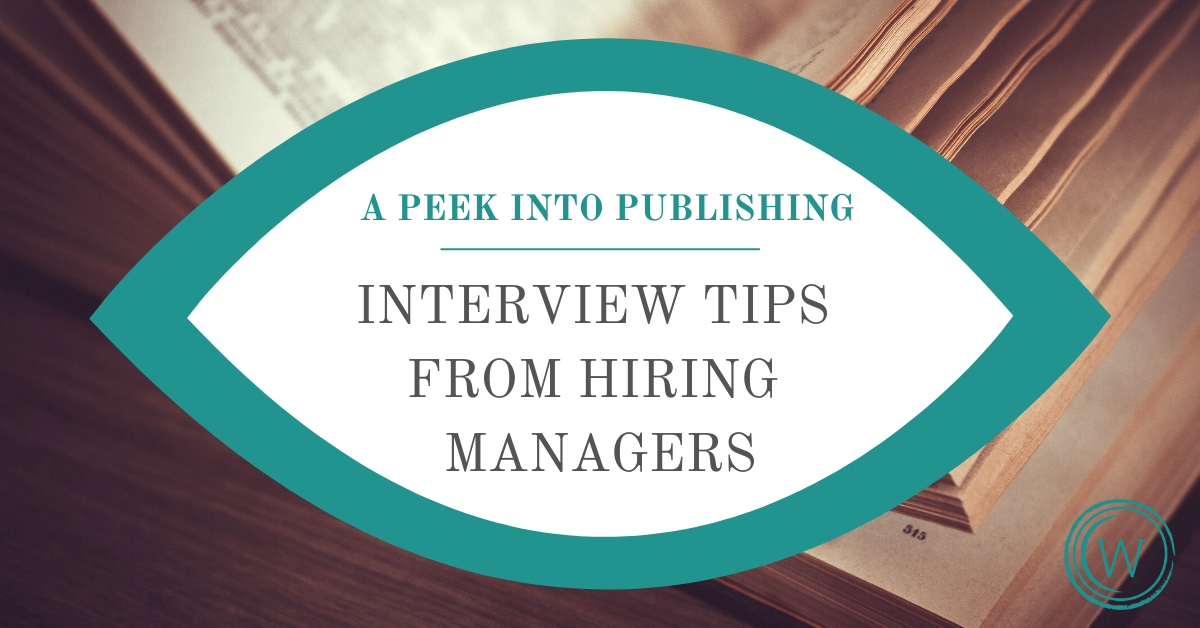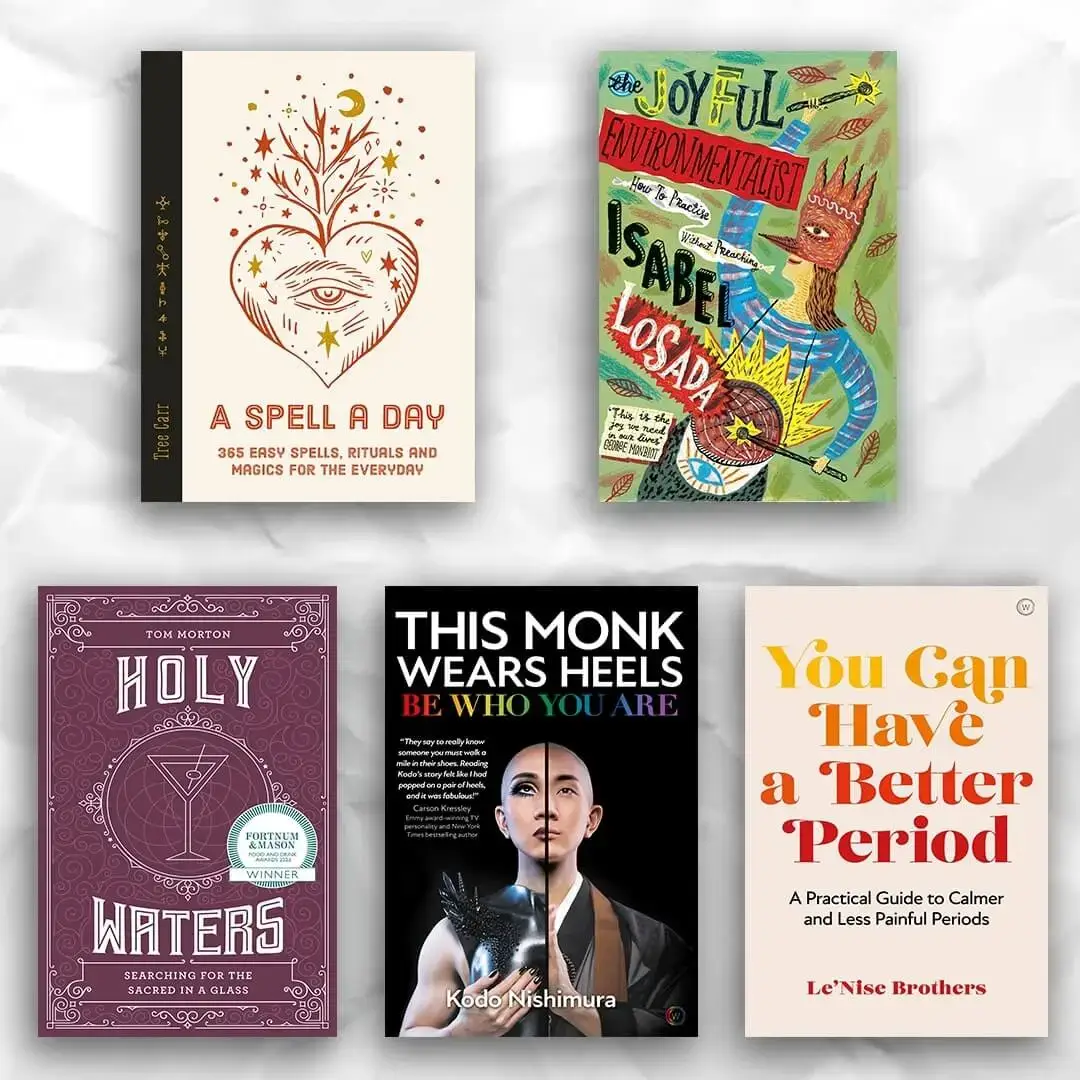A Peek into Publishing: Interview Tips from Hiring Managers

Earlier this year we asked our senior management team about good and bad job applications and how they narrowed down the pool of candidates when hiring for entry level roles – if you missed it you can find it here. This week is #WorkinPublishingWeek, so what better time to answer your questions about publishing interviews – what stands out, what not to do and what our senior managers were specifically looking for when hiring recent positions.
Fiona Robertson is Publisher here at Watkins and she hired a new Editorial and Audio Assistant in October 2020.
Laura Whitaker-Jones is our Marketing and Publicity Manager and she recruited a new Publicity Assistant last January.
After 1,500 job applications across the two roles, Watkins interviewed approximately 30 people across the two roles, so we asked the hiring managers how they narrowed down the interviewed candidates. We hope you find some insight below that helps you with your own publishing interviews. Remember, each hiring manager is different, as shown by Fiona and Laura’s answers, but some tips are universal.
Can you tell us a bit about the interview process you created?
Fiona: The applications closed 1 September 2020. After creating a longlist of the best candidates, we narrowed this down to a shortlist of ten. The decision-makers were me, the Sales and Marketing Director (now the Deputy Managing Director) and the Editorial and Audio Manager.
I sent the top ten candidates an editorial test to complete and, on the basis of this, progressed seven candidates onto stage two: the Zoom interviews. These took place in the last two weeks of September. Each interview was with the Editorial and Audio Manager and me, and lasted one hour with the same ten questions in the same order.
We then selected the top two candidates from the Zoom interviews and asked them if they would feel comfortable coming into the office to meet a few members of the team and try out some of the tasks they would be expected to do in the role. By the start of October, lockdown rules had eased, allowing six people in the office at once. We paid for the candidates’ travel and lunch expenses.
Laura: I spent six weeks interviewing candidates for my Publicity Assistant position, progressing them through four stages. After receiving over 500 applications, I interviewed the top 20–25 applicants in 30-minute “get to know you” phone calls. From these conversations, I asked ten applicants to participate in a second zoom interview with the other members of my team. Six candidates were then provided with an AI (advanced information) sales sheet for an upcoming release and asked to pull together a comprehensive publicity plan for the title. Finally, after reviewing the plans, I asked my three top choices to complete a final interview with myself and our Deputy Managing Director.
What were you looking for at each stage?
Fiona: In the first stage – the editorial test – we gave each of the shortlisted candidates a cover and a double-page spread from inside a book to see if they could spot the typos and layout errors we’d introduced. Candidates were asked to spend about an hour proofreading, using Adobe PDF to make comments.
In the second stage – the Zoom interviews – I was looking primarily at how the candidates would work as a part of our editorial team. Would they show initiative and the ability to manage a large workload while also being able to take direction and learn on the job?
In the final stage – the in-person interview that involved completing various tasks in the office – I was looking primarily at how the candidate would work with others.
Laura: In the initial 30-minute interviews, I asked candidates about their favourite books, the difference between publicity and marketing and what they knew about our Watkins/Nourish list. I wanted to get an initial impression of what they were like as people outside of their CV.
Having my existing team join me in conducting the second stage of interviews was very important to me. In this stage, I paid particular attention to the questions the candidate asked my team. I’m a strong believer that publishing interviews should not be just about the hiring manager interviewing a potential employee; they should be a two-way street. If the candidates didn’t take the opportunity to ask questions, it signalled to me that they weren’t interested in doing the research necessary to know whether the job and team were right for them. The successful candidates were the ones who asked my team a multitude of questions about the role, the company, how I was as a manager, the pros and cons of working for an independent publisher, etc. I also looked for potential candidates to ask follow-up questions in response to my team and my answers – I was looking for the interview to turn into a dialogue.
In the third stage – the publicity plan – I looked for candidates to demonstrate a willingness to look at the bigger picture of a campaign, and to think outside of the box. I paid close attention to which podcasts, TV programmes, and newspapers/magazines they suggested for the publicity plan, as well as the different ways we could incorporate virtual events. In short, I was looking for innovation, ingenuity and creativity within their suggested plan.
The fourth stage with our deputy Managing Director was important as a publicist needs to be comfortable speaking to people in high level positions. The candidate who was successful immediately demonstrated an ease and level of confidence in establishing a connection with someone at a very high level. That’s invaluable, and can often take time to teach.
Can you give an example of one question you asked and what you were looking for in the answer?
Fiona: One of the questions was “What is an editorial assistant’s most important skill?” This was a key question for me: I wanted people to acknowledge the importance of attention to detail in their answer. In fact, the successful candidate cited two important assets: attention to detail and the ability to combine working on your own with calling in help when needed. This answer stood out as it showed initiative yet also reassured me that they wouldn’t go off and make a mess of something instead of asking for guidance. Very important for a new starter in this era of working from home!
Another question was about the candidate’s main strength and weakness. It’s not a particularly helpful question but it’s one hiring managers can rarely resist. I’d recommend you prepare a genuine but not too embarrassing weakness. Don’t suggest a weakness that is actually a strength – that’s just irritating and doesn’t give any insight into how you work. On the other hand, don’t be too frank with your weaknesses. A good answer might be an admission of some lack of practical know-how (for example, that you don’t know how to use InDesign) combined with an assertion that you’re a quick learner and eager to learn. (Although if you’re going for a job as a designer, admitting you don’t know InDesign won’t do you any favours – as I said, pick your weakness carefully.)
Laura: in the first interviews, I asked, “How did you offer value in your previous role?” I was looking for insight into how the candidate assigned value to a job, as well as a list of what the candidate felt were their biggest accomplishments and strengths.
In the second round, my team asked, “What would you do in the first week, month and year in this role?” I was looking for insight into how closely the candidate had read the job description, and then insight into how the candidate would spin the position into something beyond what I had listed – in brief, how the candidate would make the job their own. I was also looking for an indication of how closely the candidate has listened to my list of my own goals for the team and the company over the next few years.
What interview answers did you hear that you didn’t like?
Fiona: When I asked about the best asset of an editorial assistant, one candidate cited the need to know the market and what the current trends are. From her answer, I had a feeling that she didn’t really want an entry-level role and probably wouldn’t stay for long if we gave her the job.
Laura: If I asked how a candidate offered value in their previous role and it was clear that they hadn’t been listening to my goals for the team and the company, or that their goals weren’t aligned with the company culture or mission, or that the candidate wasn’t capable of sharing their own aspirations/goals, then they did not progress.
What are some of the best questions you’ve been asked at the end of an interview by a candidate?
Fiona: The successful candidate asked what her priorities would be in the first month of the job. It showed she was engaging and thinking about what this specific job would be like – she didn’t want just any publishing job, she wanted this one.
One person asked how I got into the industry and my experiences at Watkins. This is a great one to have up your sleeve, because the answer is unlikely to come up during the interview and people do love to talk about themselves. You definitely need a question to ask at the end, so have this in reserve in case the ones you prepared are answered during the interview.
Laura: My favourite question was “What do you wish you had asked in your interview for the role you presently hold that you wish you had asked?” Very clever!
In terms of following up after the interview – do you expect a thank you email? And does following up regarding timeline affect your view of them?
Fiona: Following up is a great idea. If the hiring manager gets a nice email saying “I really enjoyed talking to you. Sounds like a great job to me and would love to work for you”, it creates a brilliant impression. I would strongly recommend!
Laura: I really recommend writing a thank you note after your interview via email. This is quickly becoming a lost art, and it shouldn’t be. Even a simple sentence or two will suffice. I guarantee that, in addition to providing a place for you to quickly and easily reiterate why you are a top candidate for the position, it will make you memorable in the best way possible.
How did remote interviewing over zoom and phone influence your process and experience?
Fiona: It’s a bit more difficult working with people’s unreliable internet connection or background noise, but we made an effort to set people at ease at the start of the interview, saying not to worry if the connection cuts off. We acknowledged that a Zoom interview might feel strange at first. Ultimately, however, I don’t think the experience was that different from an in-person interview.
Laura: It enabled us to interview candidates in the comfort of their own homes, which I think helped them to relax a bit more!
Do you have any additional advice for applicants?
Fiona: Even if you’re interviewing on Zoom, make sure you look like you’ve made an effort, at least from the top up! It’s still an interview and you want to give a good impression.
An interview shouldn’t be just about the employer asking you questions. You are also interviewing the hiring manager to see if this company is a good fit for you, so show interest back and ask them questions.
My final piece of advice is to be authentic. Really you should only apply and interview for the jobs you genuinely want. If you don’t want the job, it will be evident in the interview and you’ll struggle to come across as authentic.
Laura: I 100 per cent agree with Fiona. The interview should be a conversation where you are also interviewing the potential Manager and team to see if they are a fit for you. Hiring managers don’t want you to take a position for the sake of it. The job you are taking, the team you are joining, and the atmosphere you work within should also be the right ones for you, or else you’ll be unhappy in your new position and company.
I also always think it’s a good idea to thank the interviewer for their time at the conclusion of the interview and ask for a timeline for the next stage of the publishing interview process.
People on social media also asked …
When is it reasonable to ask about salary if not listed?
Fiona: The job ad we created gave a salary band so all our candidates should have had an idea of what they would be paid and whether this was liveable for them. We didn’t discuss where they fit within this band until I called them to offer them the job.
If a salary band isn’t given (which it definitely should be!), I would recommend candidates ask after the first interview, when they’re offered a second interview. There is no harm in saying that you can’t continue the process without knowing if the salary would work for you.
Laura: If a salary band isn’t listed, I’d recommend you use Glassdoor to get an idea of the company’s salary range for your position. I don’t think there’s any harm in asking for clarification to the band at the end of the first interview.
We hope you found this useful – a huge thanks to Fiona and Laura for taking the time to talk us through their hiring processes and offering their publishing interview tips!
As you can see from some of the varied responses, hiring is a situation very individual to each publishing house and each member of staff, so there is often no right or wrong answer. Nonetheless, we hope you gained some insight into the individual perspectives and found some top tips to use in the future!
If you’re an aspiring publisher, check out our regular Peek Into Publishing posts – where you can find insights into a number of departments, what the staff do and some useful key terms.
Feel free to reach us on Twitter if you have any questions, and we wish you the best of luck on your publishing journey!


